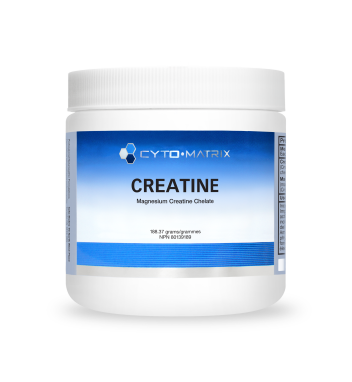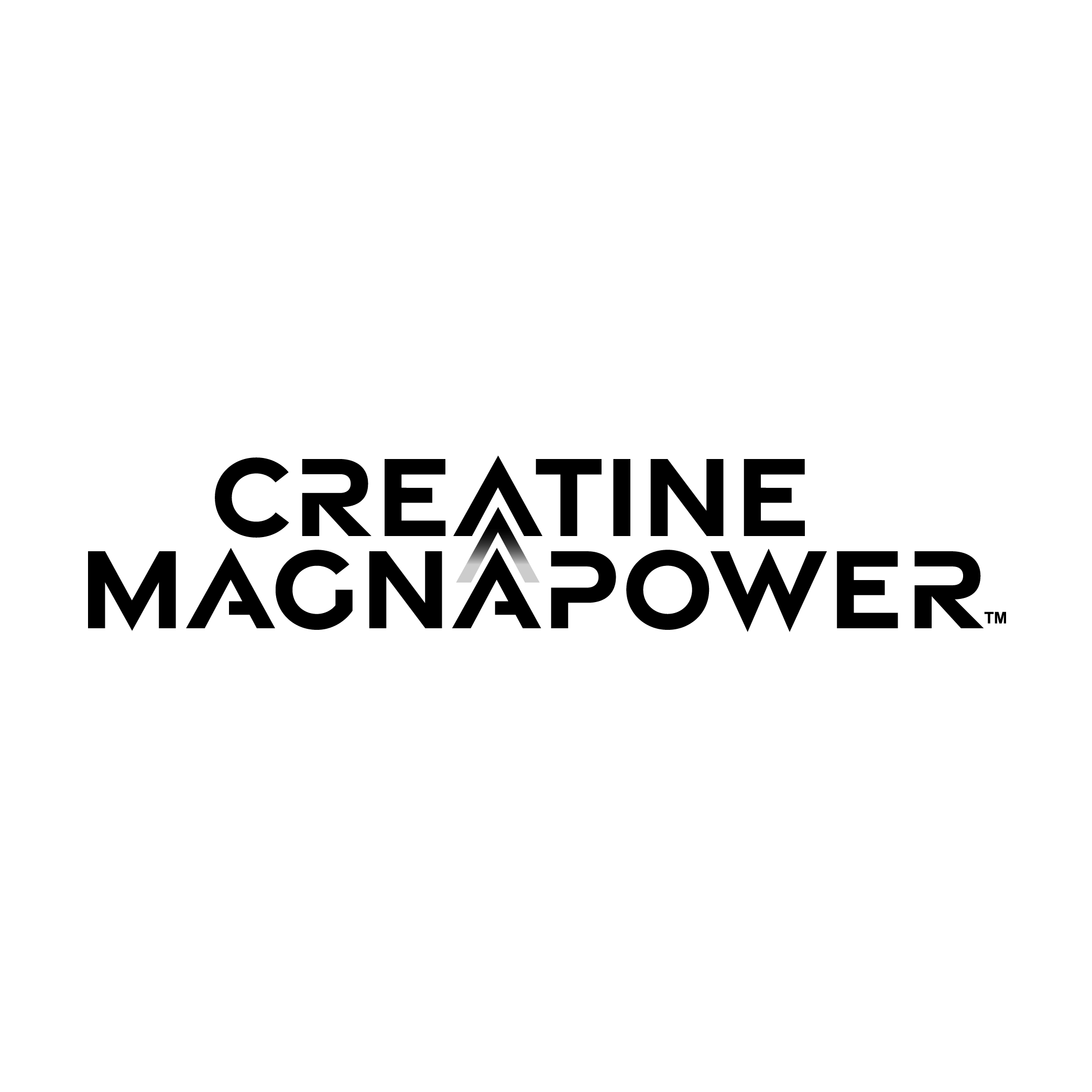Creatine – Powder
- Creatine is a well-known ergogenic aid that can improve cellular energy stores after bouts of high-intensity exercise, leading to improved muscle strength, power output and recovery
- Creatine has also demonstrated benefits for neurological health and cognitive function, improving memory, attention span and processing speed
- Magnesium is a powerful mineral involved in maintaining proper nerve and muscle function, with benefits for both exercise performance and cognition
- Cyto-Matrix offers a unique blend of creatine monohydrate and creatine bound to magnesium to offer benefits for both exercise performance and cognitive function
Creatine has traditionally been known for its ability to support exercise performance by increasing cellular energy stores and producing greater power during high-intensity activities. As a dietary compound that is only found in animal proteins such as meat and fish, and given that the body naturally excretes approximately 2 grams per day, there is a strong rationale for creatine supplementation in targeted populations. A plethora of research has confirmed that creatine supplements, often in the form of creatine monohydrate, have ergogenic benefits for both resistance training and high intensity interval training.
Creatine supplementation has been shown to improve strength gains from resistance training by approximately 10-20% relative to resistance training alone. Moreover, supplemental creatine allows for athletes to train harder and with greater volume before reaching fatigue. The end result is greater muscle hypertrophy and accumulation of lean muscle tissue over time. When it comes to endurance training, the benefits of creatine are less obvious but still noteworthy. Although creatine does not seem to improve peak oxygen uptake or produce faster race times in purely aerobic exercise, it can play a role in activities with high-intensity segments of cardiovascular exercise, such as hockey, soccer or swimming sprints. Greater power output can be achieved during these surges in effort, while recovery times between training sessions may also be reduced. In this sense, creatine may act to reduce the likelihood of injury from overtraining.
In more recent years, studies have explored the impact of creatine on other body systems and discovered that its indications reach beyond muscle tissues and into the neurological system, perhaps providing cognitive benefits as well. For example, greater dietary creatine intake in older adults has been linked with better cognitive outcomes when compared to lower dietary intake. A 2024 systematic review of 16 randomized control trials specifically found that creatine monohydrate supplementation improved areas of memory, attention time and processing speed. A separate review of 23 randomized control trials found that creatine improved memory in healthy adults.
In the realm of exercise physiology and cognitive support, magnesium certainly belongs in the conversation with creatine. Magnesium is responsible for maintaining both proper nerve and muscle function through its regulation of calcium. Not unlike creatine, it plays key roles in the creation of cellular energy within the mitochondria, while also acting as a cofactor to build DNA, RNA and many proteins. Despite its vast importance, it is commonly deficient in the Canadian population due to poor diet, medication depletions and stress. Suboptimal magnesium levels can create a pro-inflammatory state within the body which can negatively affect both muscle and nerve function.
Cyto-Matrix offers a unique blend of creatine monohydrate and MagnaPower®, a proprietary chelate of creatine bound to magnesium, to deliver the benefits of each nutrient. MagnaPower® has been studied specifically to increase intracellular water content, increase anabolic signalling, reduce delayed onset muscle soreness after high-intensity exercise, improve bench press work capacity and improve sprinting performance in elite soccer players. Each scoop of Cyto-Matrix Creatine offers 4.4 grams of creatine and 200 mg of elemental magnesium, combining two well-researched and efficacious nutrients for both exercise performance and cognitive function. 188 grams per container.
Unit of Measure above:
Each serving
| Ingredient | Amount | |
|---|---|---|
| Creatine (Creatine MagnaPower™ magnesium creatine chelate*, creatine monohydrate) | 4.4g | |
| Magnesium (magnesium creatine chelate) (Creatine MagnaPower™)* | 200mg | |
|
Non-Medicinal Ingredients:
Citric acid, phosphoric acid.
Increases lean muscle mass when used in conjunction with a resistance training regimen. Improves strength/power/performance in repetitive bouts of brief, highly-intense physical activity (e.g. sprints, jumping, resistance training). Helps to support normal muscle function, including heart muscle. Helps to support normal electrolyte balance.
Directions for Use:
Adults (18 years and older) - Take 1 scoop per day. Mix product well in 1-2 cups of liquid (water, juice, etc.) immediately before consumption. Use for a minimum of 4 weeks.
Cautions:
Ask a healthcare professional before use if • you are pregnant • you are breastfeeding • you have a kidney disorder. When using this product • you may gain weight. Keep out of reach of children.
Other Information:
Do not use if safety seal is broken.
Creatine has traditionally been known for its ability to support exercise performance by increasing cellular energy stores and producing greater power during high-intensity activities. As a dietary compound that is only found in animal proteins such as meat and fish, and given that the body naturally excretes approximately 2 grams per day, there is a strong rationale for creatine supplementation in targeted populations. A plethora of research has confirmed that creatine supplements, often in the form of creatine monohydrate, have ergogenic benefits for both resistance training and high intensity interval training.
Creatine supplementation has been shown to improve strength gains from resistance training by approximately 10-20% relative to resistance training alone. Moreover, supplemental creatine allows for athletes to train harder and with greater volume before reaching fatigue. The end result is greater muscle hypertrophy and accumulation of lean muscle tissue over time. When it comes to endurance training, the benefits of creatine are less obvious but still noteworthy. Although creatine does not seem to improve peak oxygen uptake or produce faster race times in purely aerobic exercise, it can play a role in activities with high-intensity segments of cardiovascular exercise, such as hockey, soccer or swimming sprints. Greater power output can be achieved during these surges in effort, while recovery times between training sessions may also be reduced. In this sense, creatine may act to reduce the likelihood of injury from overtraining.
In more recent years, studies have explored the impact of creatine on other body systems and discovered that its indications reach beyond muscle tissues and into the neurological system, perhaps providing cognitive benefits as well. For example, greater dietary creatine intake in older adults has been linked with better cognitive outcomes when compared to lower dietary intake. A 2024 systematic review of 16 randomized control trials specifically found that creatine monohydrate supplementation improved areas of memory, attention time and processing speed. A separate review of 23 randomized control trials found that creatine improved memory in healthy adults.
In the realm of exercise physiology and cognitive support, magnesium certainly belongs in the conversation with creatine. Magnesium is responsible for maintaining both proper nerve and muscle function through its regulation of calcium. Not unlike creatine, it plays key roles in the creation of cellular energy within the mitochondria, while also acting as a cofactor to build DNA, RNA and many proteins. Despite its vast importance, it is commonly deficient in the Canadian population due to poor diet, medication depletions and stress. Suboptimal magnesium levels can create a pro-inflammatory state within the body which can negatively affect both muscle and nerve function.
Cyto-Matrix offers a unique blend of creatine monohydrate and MagnaPower®, a proprietary chelate of creatine bound to magnesium, to deliver the benefits of each nutrient. MagnaPower® has been studied specifically to increase intracellular water content, increase anabolic signalling, reduce delayed onset muscle soreness after high-intensity exercise, improve bench press work capacity and improve sprinting performance in elite soccer players. Each scoop of Cyto-Matrix Creatine offers 4.4 grams of creatine and 200 mg of elemental magnesium, combining two well-researched and efficacious nutrients for both exercise performance and cognitive function. 188 grams per container.
Unit of Measure above:
Each serving
| Ingredient | Amount | |
|---|---|---|
| Creatine (Creatine MagnaPower™ magnesium creatine chelate*, creatine monohydrate) | 4.4g | |
| Magnesium (magnesium creatine chelate) (Creatine MagnaPower™)* | 200mg | |
|
Non-Medicinal Ingredients:
Citric acid, phosphoric acid.
Increases lean muscle mass when used in conjunction with a resistance training regimen. Improves strength/power/performance in repetitive bouts of brief, highly-intense physical activity (e.g. sprints, jumping, resistance training). Helps to support normal muscle function, including heart muscle. Helps to support normal electrolyte balance.
Directions for Use:
Adults (18 years and older) - Take 1 scoop per day. Mix product well in 1-2 cups of liquid (water, juice, etc.) immediately before consumption. Use for a minimum of 4 weeks.
Cautions:
Ask a healthcare professional before use if • you are pregnant • you are breastfeeding • you have a kidney disorder. When using this product • you may gain weight. Keep out of reach of children.
Other Information:
Do not use if safety seal is broken.


